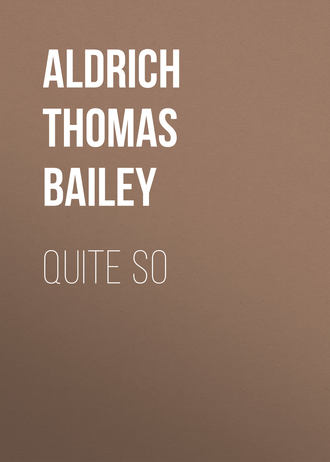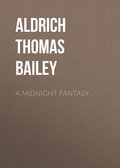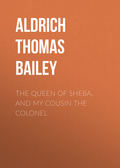
Aldrich Thomas Bailey
Quite So
That Latin grammar! He always had it about him, reading it or turning over its dog’s-eared pages at odd intervals and in out-of-the-way places. Half a dozen times a day he would draw it out from the bosom of his blouse, which had taken the shape of the book just over the left breast, look at it as if to assure himself it was all right, and then put the thing back. At night the volume lay beneath his pillow. The first thing in the morning, before he was well awake, his hand would go groping instinctively under his knapsack in search of it.
A devastating curiosity seized upon us boys concerning that Latin grammar, for we had discovered the nature of the book. Strong wanted to steal it one night, but concluded not to. “In the first place,” reflected Strong, “I haven’t the heart to do it, and in the next place I have n’t the moral courage. Quite So would placidly break every bone in my body.” And I believe Strong was not far out of the way.
Sometimes I was vexed with myself for allowing this tall, simple-hearted country fellow to puzzle me so much. And yet, was he a simple-hearted country fellow? City bred he certainly was not; but his manner, in spite of his awkwardness, had an indescribable air of refinement. Now and then, too, he dropped a word or a phrase that showed his familiarity with unexpected lines of reading. “The other day,” said Curtis, with the slightest elevation of eyebrow, “he had the cheek to correct my Latin for me.” In short, Quite So was a daily problem to the members of Mess 6. Whenever he was absent, and Blakely and Curtis and Strong and I got together in the tent, we discussed him, evolving various theories to explain why he never wrote to anybody and why nobody ever wrote to him. Had the man committed some terrible crime, and fled to the army to hide his guilt? Blakely suggested that he must have murdered “the old folks.” What did he mean by eternally conning that tattered Latin grammar? And was his name Bladburn, anyhow? Even his imperturbable amiability became suspicious. And then his frightful reticence! If he was the victim of any deep grief or crushing calamity, why did n’t he seem unhappy? What business had he to be cheerful?
“It’s my opinion,” said Strong, “that he ‘s a rival Wandering Jew; the original Jacobs, you know, was a dark fellow.”
Blakely inferred from something Bladburn had said, or something he had not said—which was more likely—that he had been a schoolmaster at some period of his life.
“Schoolmaster be hanged!” was Strong’s comment. “Can you fancy a schoolmaster going about conjugating baby verbs out of a dratted little spelling-book? No, Quite So has evidently been a—a—Blest if I can imagine what he ‘s been!”
Whatever John Bladburn had been, he was a lonely man. Whenever I want a type of perfect human isolation, I shall think of him, as he was in those days, moving remote, self-contained, and alone in the midst of two hundred thousand men.
II
The Indian summer, with its infinite beauty and tenderness, came like a reproach that year to Virginia. The foliage, touched here and there with prismatic tints, drooped motionless in the golden haze. The delicate Virginia creeper was almost minded to put forth its scarlet buds again. No wonder the lovely phantom—this dusky Southern sister of the pale Northern June—lingered not long with us, but, filling the once peaceful glens and valleys with her pathos, stole away rebukefully before the savage enginery of man.
The preparations that had been going on for months in arsenals and foundries at the North were nearly completed. For weeks past the air had been filled with rumors of an advance; but the rumor of to-day refuted the rumor of yesterday, and the Grand Army did not move. Heintzelman’s corps was constantly folding its tents, like the Arabs, and as silently stealing away; but somehow it was always in the same place the next morning. One day, at last, orders came down for our brigade to move.
“We ‘re going to Richmond, boys!” shouted Strong, thrusting his head in at the tent; and we all cheered and waved our caps like mad. You see, Big Bethel and Bull Run and Ball’s Bluff (the bloody B’s, as we used to call them) had n’t taught us any better sense.
Rising abruptly from the plateau, to the left of our encampment, was a tall hill covered with a stunted growth of red-oak, persimmon, and chestnut. The night before we struck tents I climbed up to the crest to take a parting look at a spectacle which custom had not been able to rob of its enchantment. There, at my feet, and extending miles and miles away, lay the camps of the Grand Army, with its camp-fires reflected luridly against the sky. Thousands of lights were twinkling in every direction, some nestling in the valley, some like fire-flies beating their wings and palpitating among the trees, and others stretching in parallel lines and curves, like the street-lamps of a city. Somewhere, far off, a band was playing, at intervals it seemed; and now and then, nearer to, a silvery strain from a bugle shot sharply up through the night, and seemed to lose itself like a rocket among the stars—the patient, untroubled stars. Suddenly a hand was laid upon my arm.







